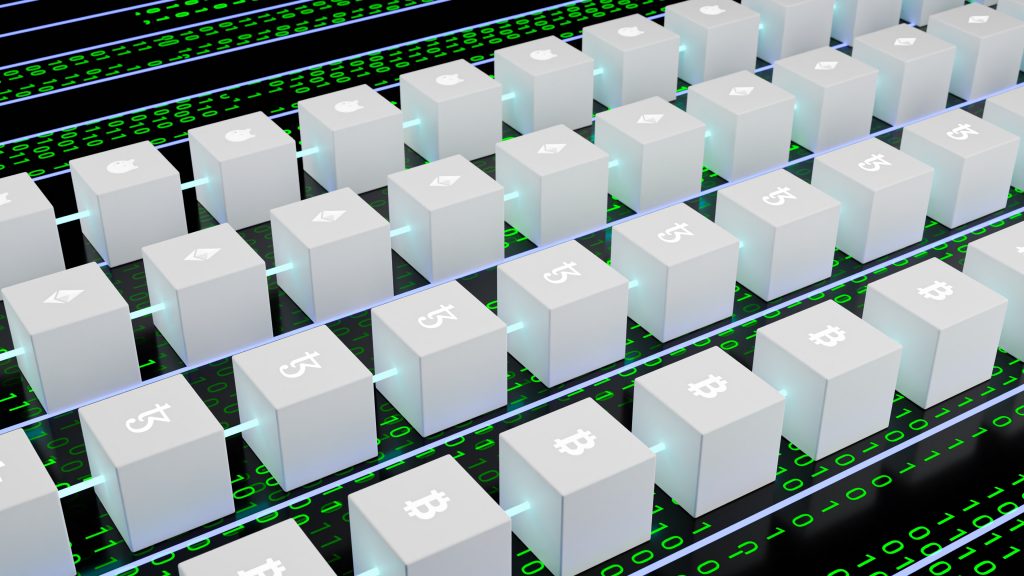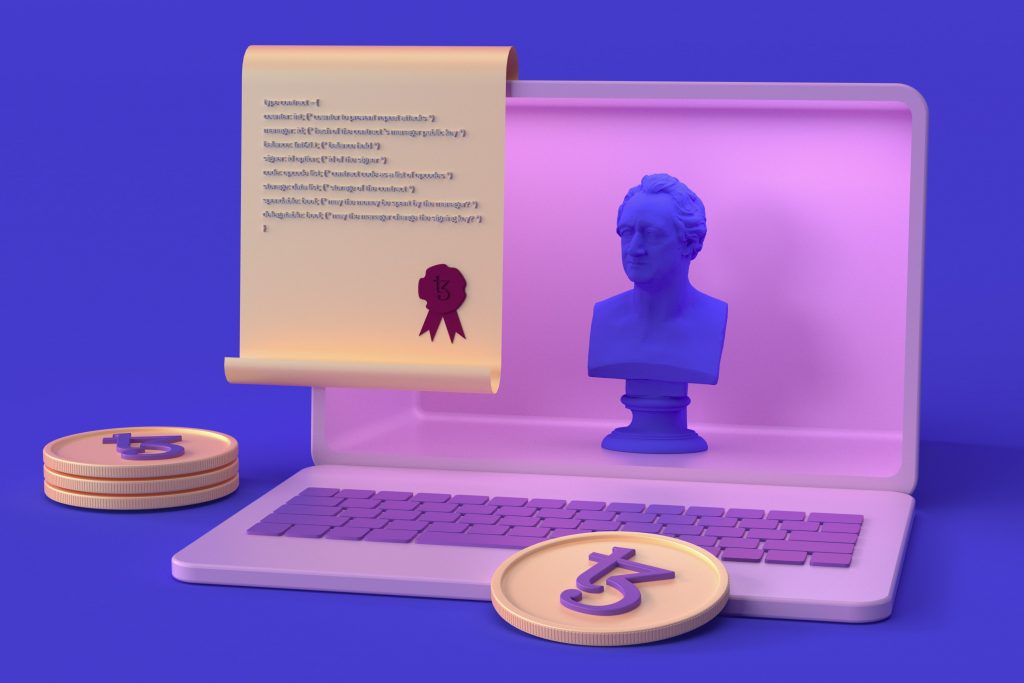Blockchain to NFT, a Journey from Fame to Sham
Lets’s start this in a fun way by talking about two famous Netflix series – Money Heist and Squid Game. No, I am not going to talk about the whole series. I want to share my ideology about both series. Money Heist is based on a revolution, people fight against banks controlling the currency so they want to steal newly printed money that is not hard earned by anyone. On the other hand, Squid Game is about what extreme acts people can do, to get a huge amount of money, by cheating, fooling, or whatever, and once you get the money just escape from the game/system. Can you ever imagine the “Professor” (Main character in Money Heist) participating in Squid Game? Weird, right? When I first looked up Non-Fungible Token on the internet, I felt exactly that, weird. This is the story about a terrific, revolutionary technology’s introduction, evolution, use, and misuse – The Blockchain Tech.
A small flashback (Way too much back)
At the start of the human race’s evolution, I don’t think they ever needed to own anything at all. Earth provided in abundance and everyone enjoyed everything available to them. When humans started building their wealth and tools, they might have used some techniques to decide ownership. I am not an expert in history, so all I can guess is something like these – when 10 people are hunting an animal, whose arrow hits the animal first they are the owner of the meat, Or when a few people are exploring new areas and one sees a fertile land before others, then he owns it.
So ownership is based on trust and laws. People need to trust each other and follow the laws for this kind of ownership to work. This used to work, still works in recent times not by people’s choice, but by threatening them with the consequences of breaking the law.
Recent times
We still face the trust problem in our society. If I say I have 1 Crore rupees with me, how you will validate? You can, maybe, by validating my PAN number (if you have sufficient access to the systems). What if I don’t have any ID, chances are you will never believe me. But we trust a few parties – banks, governments, international agencies, etc to not get into a complete mess. So that 1 Crore money thing can be validated if I have a bank statement that shows the balance of 1 Crore. What if the next day, the bank takes all my money and says you have nothing. Then I trust the electronic system in banks and government and laws to validate evidence and give me my money back.
So the trust problem is big. We would need some mechanism that can validate truth easily and effectively, which is either unbreakable or foolproof.

The Blockchain
Blockchain is just a series of blocks arranged in a serial fashion where one block is connected to its immediate predecessor and successor using keys. Every block is encrypted. The encryption key of one block depends on the encryption key of the previous block in the chain. So, if you want to hack a blockchain tech you need to first hack the block that you want to, then hack all the consecutive blocks until the last block (before a new block gets added to the blockchain because if a new block gets added it invalidates your hacking). If you own many supercomputers then also it is an extremely challenging task, and even if you succeed in this somehow you have just hacked the blockchain in one of many decentralized computers that constantly validate the whole blockchain against each other. So your hacked version will be rejected in a moment and blockchain remains original without any issues.
Ok, now we have a non-hackable, resilient tech. Let’s see how we can use it. Oh, I almost forgot to say, blockchain tech is just the blocks, you can put whatever you want inside each box (keep in mind, this will make the story more interesting below).

Cryptocurrencies
So, now we have a non-hackable tech that can be used to store any information, what would you like to store? The immediate thought goes to money/currency. Remember the claim that I did earlier, what if I had 1 Crore rupees worth of cryptocurrency with me, and you can very well look at a public ledger that is in blockchain block and validate. Awesome. And as an added advantage, whenever I do a transaction using that cryptocurrency it is being recorded in another block automatically. So now we have a trusted network to assess how much each person is worth, and what transactions they are doing. Cryptocurrencies are created using different logic or algorithms and limits, etc. But one thing is common, every currency is using blockchain as a tech to store the ledger and make it very reliable to validate. Some people followed this trend and used cryptocurrencies a lot, some used less. Some are speculated on the future price of cryptocurrencies and traded in crypto markets. But eventually, there are a lot of cryptocurrencies anyway and people started thinking what else I can put into that non-hackable box?

Non Fungible Tokens (NFTs)
That thought lead to something called NFT. In theory, this is a good concept. You know about the painting Monalisa right? Can you get a picture of Monalisa from the internet? Yes. But whether that will reduce the value of the actual painting? Never. Since the actual painting is a tangible asset you can display it, auction it, insure it, sell it, etc. But think about a digital artist, who created a masterpiece on a digital platform, let it be painting, video, etc. Once that is available on the open internet its got no value. Anyone can download and use it, no one can tell the difference between the original creation and replicas. NFTs solved this problem by recording the ownership of that digital item in a smart contract and saving that smart contract inside one of our non-hackable boxes. Here since they are storing contracts they needed to use a special kind of box called Etherium. So whenever the creator sells the digital content to anyone else, it is recorded in the smart contract and a new box will be added with information about the new owner. So even though there are a lot of replicas of that digital art on the internet, one can identify the owner of the actual digital art at any time and anyone with enough money mentioned in the smart contract can buy that from the owner.
Up to this point, everything was fair. Until people realized how they can make money using NFTs. First of all, people who are not even creators started becoming creators of new NFTs. They have used computer programs or algorithms to generate random images and started listing them as NFTs. People were crazily buying those, thinking all NFTs are going to be worth millions in the future. But it is not right, if there are no buyers in the future you will end up with a JPEG image in your hand for your huge investment. Slowly people started realizing this and stopped buying NFTs crazily. The sellers who promote NFTs started campaigns using movies and sports stars to attract more buyers, and it is still on.
The real craziness started when some people started to realize another use of NFTs. What if I say you can buy the Taj Mahal? and everyone in the world know that you are the owner. Now in reality you cannot buy the Taj. But the web platform that is selling Taj created a whole replica of the earth in their platform. It’s like google earth of their own. Anyone can spend money and buy any piece of land on that platform. Others in that platform know you are the owner. The stupidity behind this is there are many such platforms. So the money you are spending is not giving you anything in actual land, nothing that is unique across all platforms, it’s all a greedy sham game of the people behind each of such platforms. Seriously, what you are going to do with your virtual real estate on one website when you are retiring? You cannot use it. You cannot sell it because probably by then, there are thousands of other platforms, and nobody cares. NFTs if used in the real sense to give credit to the real creators on the internet then it’s a good thing. But the way it is evolving seems to be people making it a money printing machine for a short period.
Note: I am not a full-time crypto researcher. These are my thoughts, not financial advice.

